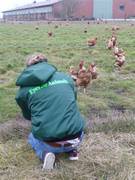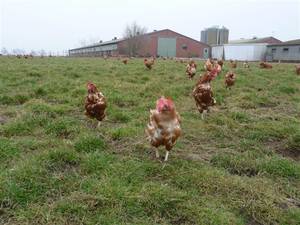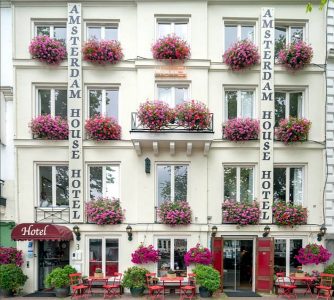 There is a big debate whether hens on free-range farms are really better off than hens in cages. Many people within the egg industry, and even a few scientists, claim that hens in cages are better because they are protected from predators, from disease, from collecting mud balls on their feet and eventually not being able to walk anymore and from attacks by others in a flock. True, cages protect hens from these things, but Eyes on Animals does not consider battery cages to ever be good because they do not have the potential AT ALL to satisfy the behavioural needs of a hen. She cannot stretch her wings, perch, dustbathe or forage. When free-range farms are well-managed and built, they can be a paradise for hens and provide all the security of a cage, and also the ability to express natural behavious. We think the only way hens should be allowed to be kept is in a free-range system. Eyes on Animals randomly visited a hen farm in the Belgium country-side. The hens had a large amount of outdoor space and seemed extremely content. They were busy pecking at the grass and dirt, others were running, certain were dust-bathing, while others were walking up the ramp into their indoor quarters where they could perch or nest. None of the hens had mud balls on their feet, as the ground was properly drained and grass was planted to absorb the moisture. Should people want to eat eggs, the farmer of these hens is the right person to support!
There is a big debate whether hens on free-range farms are really better off than hens in cages. Many people within the egg industry, and even a few scientists, claim that hens in cages are better because they are protected from predators, from disease, from collecting mud balls on their feet and eventually not being able to walk anymore and from attacks by others in a flock. True, cages protect hens from these things, but Eyes on Animals does not consider battery cages to ever be good because they do not have the potential AT ALL to satisfy the behavioural needs of a hen. She cannot stretch her wings, perch, dustbathe or forage. When free-range farms are well-managed and built, they can be a paradise for hens and provide all the security of a cage, and also the ability to express natural behavious. We think the only way hens should be allowed to be kept is in a free-range system. Eyes on Animals randomly visited a hen farm in the Belgium country-side. The hens had a large amount of outdoor space and seemed extremely content. They were busy pecking at the grass and dirt, others were running, certain were dust-bathing, while others were walking up the ramp into their indoor quarters where they could perch or nest. None of the hens had mud balls on their feet, as the ground was properly drained and grass was planted to absorb the moisture. Should people want to eat eggs, the farmer of these hens is the right person to support!


